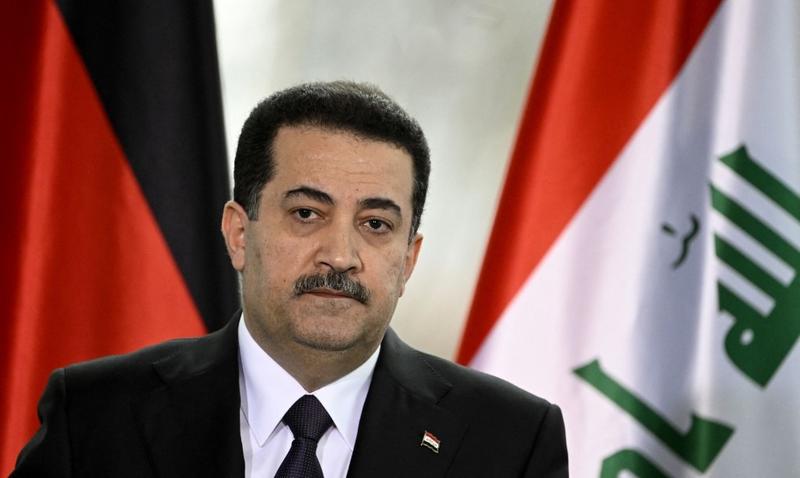 Iraq's Prime Minister Mohammed Shia al-Sudani and the German Chancellor (not in picture) give a joint press conference at the Chancellery in Berlin on Jan 13, 2023.
(PHOTO / AFP)
Iraq's Prime Minister Mohammed Shia al-Sudani and the German Chancellor (not in picture) give a joint press conference at the Chancellery in Berlin on Jan 13, 2023.
(PHOTO / AFP)
Erbil - After more than a year of political deadlock, Iraqi Prime Minister Mohammed Shia al-Sudani could face a debilitating new crisis with Kurdish leaders that risks undermining his efforts to set policy and compile a badly needed state budget.
Sudani, whose government was approved in October, has vowed to reform the economy, fight corruption, improve deteriorating public services and combat poverty and unemployment — tall orders in a country that has been craving stability and cash since the 2003 US-led invasion.
The Kurdish Democratic Party may withdraw its support for the federal government if Iraqi Prime Minister Mohammed Shia al-Sudani fails to fulfil his promises to fix long-standing disputes between Erbil and Baghdad, according to two Iraqi lawmakers and a Kurdish government official
Without support from the powerful Kurdish Democratic Party (KDP) which helped him come to power and holds 31 seats in parliament, he would find it difficult to advance his agenda.
The central government's strained relations with the Kurds — often part of Iraq's political landscape since Saddam Hussein was toppled in the 2003 invasion — could hamper Sudani's efforts after a long period of paralysis.
The KDP may withdraw its support for the federal government if he fails to fulfil his promises to fix long-standing disputes between Erbil and Baghdad, according to two Iraqi lawmakers and a Kurdish government official.
ALSO READ: France and Iraq sign strategic partnership agreement
That could leave him struggling to pass bills in parliament and enact reforms.
Before Sudani formed his government he struck a deal with the KDP, which dominates the administration in Erbil, capital of the semi-autonomous region in northern Iraq.
The agreement included ending a long-running dispute over budget transfers to Erbil and oil revenue sharing between the national government and Kurdistan, according to three Kurdish officials.
Under the Iraqi constitution, the Kurdish region is entitled to a portion of the national budget. But the arrangement collapsed in 2014 when the Kurds began selling crude independently from Kurdistan.
In 2017, Iraqi forces retook disputed territories including the oil city of Kirkuk. Baghdad resumed some budget payments, but they have been sporadic.
The KDP made it clear that they would stop supporting Sudani if he didn't keep his promises, according to one of the Kurdish officials.
Sudani came to power after more than a year of political deadlock as infighting among Shi'ite and Kurdish groups prevented the formation of a government, hampering efforts to rebuild a country on its knees after decades of conflict.
The paralysis left Iraq without a budget for 2022 holding up spending on much-needed infrastructure projects and economic reform and depriving Kurdish authorities of revenues needed to pay international oil firms and the salaries of thousands of local workers.
ALSO READ: Iraq elects new president after year-long political deadlock
A KDP official said after the government was formed last year that the Kurds wanted to end the deadlock, which was why they supported Sudani's government, but that if the other side failed to deliver they would withdraw that support.
"There are some political forces that are trying to break our will and we reject this and won't allow it," said Shawan Taha, a KDP spokesman.
Carrot and Stick Approach
In January, the Iraqi Federal Supreme Court ruled that orders from the Baghdad government to transfer money to the Kurdistan Regional Government (KRG) to pay salaries in 2021 and 2022 were illegal because they broke Iraq's budget law.
Massoud Barzani, president of the ruling KDP, said the court has taken a "hostile position" against the region and "seems to have replaced the revolutionary court in the previous regime", referring to an infamous court of the Baathist regime known for issuing death sentences against regime opponents.
A spokesman for the KRG, Jotiar Adil, said the "politically motivated" court was trying to spoil the deal between Erbil and Baghdad.
A KRG delegation was in Baghdad on Monday to discuss the budget as well as hydrocarbon laws. A source with knowledge of the meetings said Erbil and Baghdad remained far apart on the hydrocarbon law.
According to an adviser, who spoke on condition of anonymity, Sudani has tasked the cabinet's legal team with finding a solution to allow salary transfers without breaching the court verdict.
Other political actors in Sudani’s camp in Baghdad see escalation with the Kurds by using such court rulings as a necessary political tactic to put him in a stronger negotiating position, according to lawmakers.
But the KRG's Adil was still hopeful that a compromise could be agreed on. He said the KRG delegation would be in Baghdad again on Sunday, and he denied that the KDP was threatening to withdraw its support for the government in Baghdad.
"There are obstacles in reaching an agreement with Baghdad. But there is a serious and real intention to reach an agreement from the KRG, and we felt the seriousness as well from Sudani to solve those obstacles," he said.


